The art of mental wellbeing
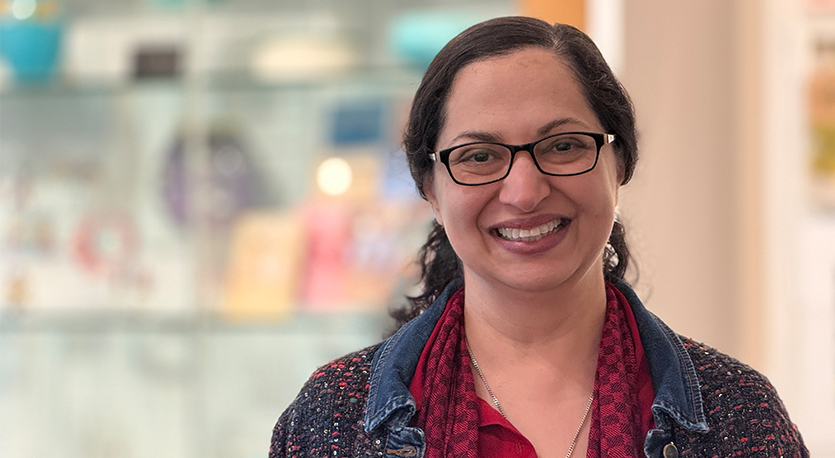
Dr Christina Davies focuses on the arts to enhance mental health.
Maintaining good mental health is a cornerstone of overall wellbeing. It plays a crucial part in fostering resilience, balance, and clarity, in shaping the way we think and feel, and the decisions we make in daily life. However, in Australia, around 1 in 5 adults and 1 in 7 young people experience mental ill health every year.
A healthy dose of the arts
Increasing demands on health systems calls for innovative, evidence-based, and cost-effective solutions to support better community wellbeing. Working towards the solution is Dr Christina Davies from the School of Humanities and the School of Health and Clinical Sciences at The University of Western Australia (UWA). In her role as Director of the Centre for Arts, Mental Health and Wellbeing WA, she leads a cross-sector initiative between the arts and health sectors, offering a positive and sustainable method for promoting community mental health and wellbeing.
“I think the arts is part of the mental health puzzle that we have been missing.”
Dr Christina Davies, UWA
Dr Davies Doctoral thesis defined arts engagement for population based research – this definition has been described as a “cornerstone of arts-health research for the past decade” and cited in the 2020 World Health Organization Arts-Health Report. Her thesis identified the relationship between arts engagement and population health, and that individual differences are important when applying the research. In 2016, her team quantified the ‘arts dose’ linked to mental wellbeing and found that two or more hours per week of arts engagement can significantly boost mental health for adults in the general population. This ‘arts dose’ is also cited in 2023 Revive, Australia’s National Cultural Policy.
“You don’t have to be good at the arts for the arts to be good for you. It’s about having a go and doing what makes you most happy.”
Dr Christina Davies, UWA
This work identified the need for a new and innovative approach. Combined with her knowledge of psychology, health promotion and epidemiology, and her background in the arts, her research formed the foundation of the Good Arts Good Mental Health campaign and program.
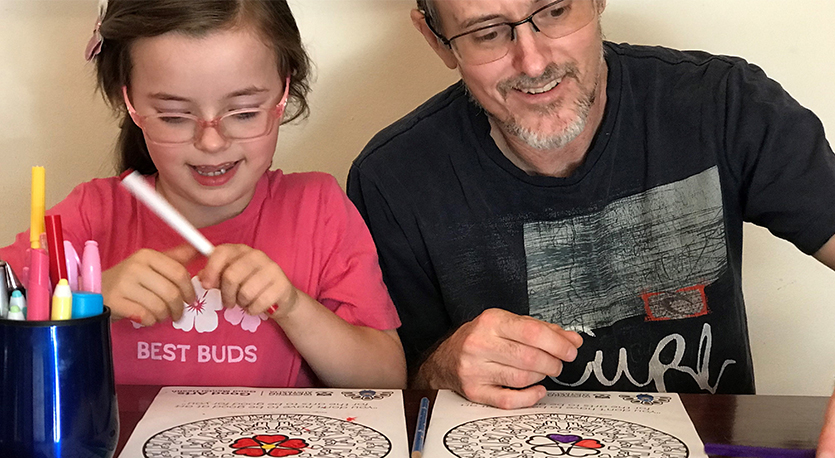
Just two hours a day arts engagement can boost mental health.
Have fun expressing yourself
The arts encompass a wide range of creative experiences. And just two hours a week can make a notable difference to mental health. The arts includes activities like listening to music, reading, dancing, singing, painting, sewing, craft, colouring, woodwork, attending a concert, performance, exhibition, art class, and so much more.
In their research, the team also considered arts engagement from the perspective of young people, patients and older adults (born 1946-1964). Their 2023 collaboration with the Busselton study found a direct link for older adults between arts engagement and physical and mental health.
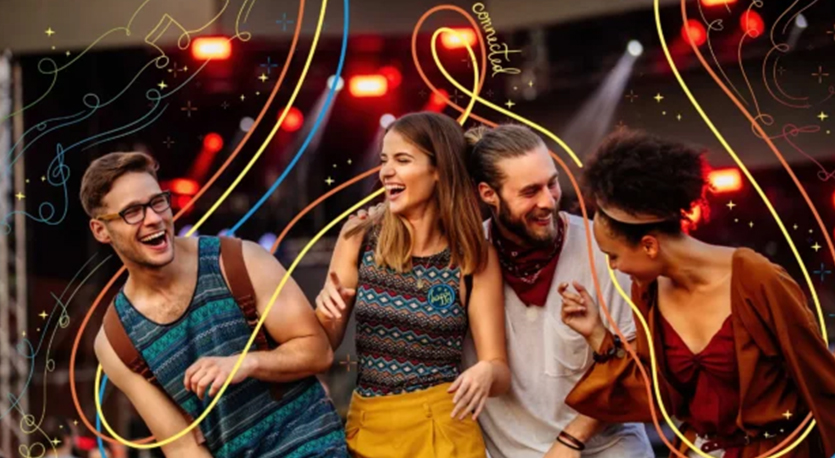
The arts include activities that increase happiness, joy, relation and connection to others.
Good Arts Good Mental Health (GAGMH)
The Good Arts Good Mental Health initiative started in 2022. This world-first, statewide, health promotion initiative included a media campaign, learning opportunities and programs. The campaign and website were launched in 2024 and by June they had targeted nearly 3 million West Australians to promote arts engagement as a low cost – no cost option for better mental wellbeing.
The initiative offers an evidence based, arts-mental health program that communicates the value of recreational arts as a health promotion strategy, and provides multi-sector professional development and programs to positively impact community arts engagement and mental wellbeing.
GAGMH is a collaboration between the research team, 31 government, industry and philanthropic partners, including a government mentor group, consumer reference group and the 3000 Australians that have helped shape the GAGMH initiative. Partners include Western Australian Future Health Research and Innovation Fund (an initiative of the WA state government), Minderoo Foundation, The Ian Potter Foundation, the WA Department of Creative Industries, Tourism and Sport, CircuitWest, and St John of God Health Care.
Input from the community has been particularly important in understanding the existing needs and barriers, and in shaping the campaign focus, messaging and language.
The current community informed goals of GAGMH are to:
- empower the community to participate in arts activities
- enhance understanding of the arts-mental health relationship and 2hr/week arts dose
- offer no cost – low cost arts activities that can be easily integrated into daily life, and
- emphasise that “you don’t have to be good at art for the arts to be good for you”
“This has allowed me to transform my ‘arts-dose’ research into a powerful mental health promotion initiative by the people, for the people.”
Dr Christina Davies, UWA
The GAGMH initiative includes a website designed to encourage people to explore and participate in creative activities and use the arts as a tool for mental wellbeing.
The website provides FREE learning videos and interactive resources:
- a short course
- free downloadable resources
- a 5-day arts challenge, and
- free access to the team’s publications and research
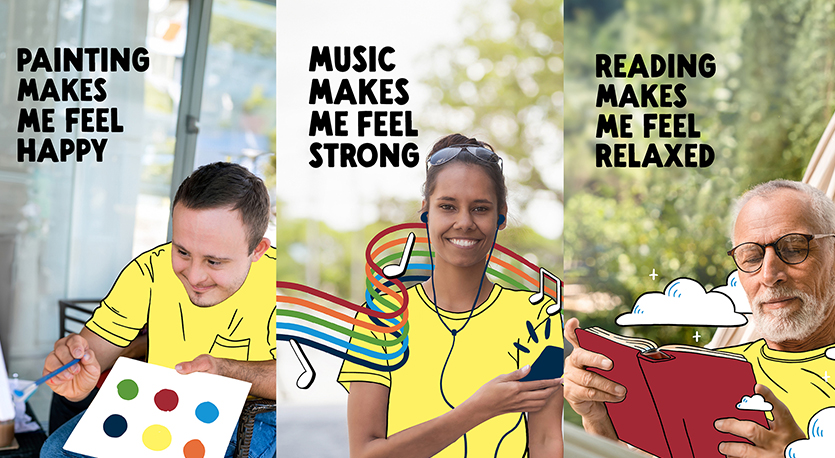
The Good Arts, Good Mental Health program communicates the value of recreational arts as a health promotion strategy.
Promoting positivity
The team are passionate about encouraging people to take part in the arts activities that make them feel good to promote good mental health. In addition to the website, the team have engaged in TV, radio, and news media, as well as digital platforms including Spotify, a YouTube channel, Facebook and Instagram accounts.
Using GAGHM as a case study, their 2023 research on the use of social media to promote art challenges found it to be cost effective, interactive, and an valuable tool in delivering evidence-based messaging, advocating its use by health professionals and policy makers.
Engaging with the community and partners is key to the program’s realisation and a mass-media campaign was undertaken throughout 2024, with great success.
Additional campaign activities included:
- Demonstration programs e.g. GAGMH at the Western Derby. Their work with the Dockers allowed for prominent placement of GAGMH messaging on the scoreboard and pitch. 56,536 attended the game and saw the signage. Of those surveyed, 99% agreed with the message and 65% intended to act on the message.
- Radio: NOVA 93.7 including an on-air drawing activity, Radio Mama (Midwest Aboriginal Media Association) promotion using co-design and recorded in both an Aboriginal male and female voice as well as on RTRFM 92.1, Triple M, and Hit FM.
- Television pieces: on Channel Nine News and ABC News.
- Print media: such as Scenestr Magazine and editorials.
- Community and multi-sector professional development workshops. 97% of participants surveyed enjoyed the workshops, 96% agreed the workshops increased their arts-mental health knowledge, and 81% intended to engage in the arts for their own mental wellbeing.
- Campaign merchandise, event signage and posters.
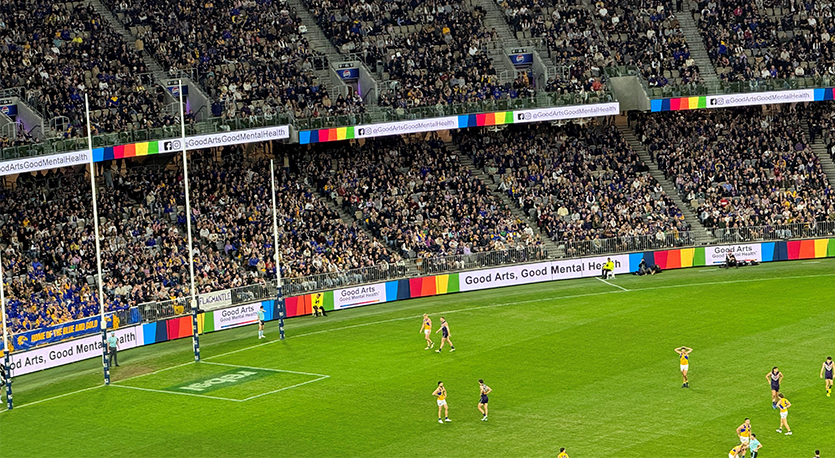
The GAGHM signage was prominently placed at the Western Derby in July 2024
The team have made significant contributions to promoting mental health through arts-health research and through the Good Arts, Good Mental Health initiative. While currently focused on Western Australia, the vision for the future is to expand the program nationally or even globally, with a recent presentation to European Union member states.
What makes me most proud about GAGMH is that we are empowering people to impact their own mental wellbeing by doing the arts that makes them feel good.
“What makes me most proud about GAGMH is that we are empowering people to impact their own mental wellbeing by doing the arts that makes them feel good.”
Dr Christina Davies, UWA
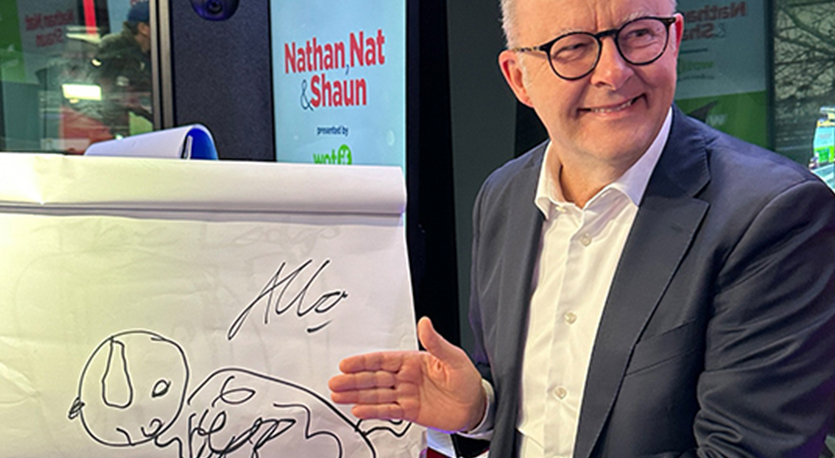
Prime Minister Anthony Albanese at Nova 93.7 Studios participating in a Good Arts Good Mental Health challenge.
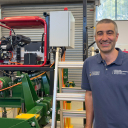
 Advancing Nanomaterials from Lab to Market: Ablano’s Journey
Advancing Nanomaterials from Lab to Market: Ablano’s Journey 